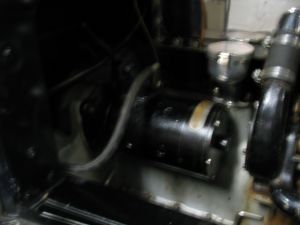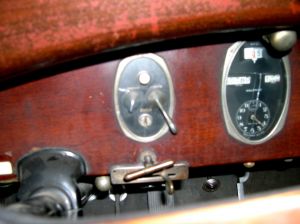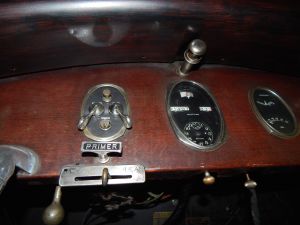- Home
- About Us
- Join/Renew
- Member Benefits
- Member Pages
- Log In
- Help
- Museum Store
Hello,
The Positive side of my battery is hooked up to the Starter and the Negative side is grounded to the Bellhousing. I thought that Pierce Arrows had Positive Grounds. If that is so mine is reversed. Can a car run if the wiring is reversed? Is it possible when my car was restored that the wiring was changed to be this configuration?
Thank you,
Ken
Ken,
Has the car started and run while in your ownership or did you just haul it onto a trailer and drag it home?
I believe that the positive pole cable of your battery should connect to your bell-housing while the negative pole / cable should connect to your starter.
If the opposite is true, then you should post a photo and others will chime in.
if you never ran it, I would confirm its polarity before I fired it up for the first time.
Peter
Peter,
Yes the car started and we drove it around town. We actually drove it a few times. Here is a picture of the Positive cable hooked up to the Starter.
Thank you,
Ken

Peter,
I found out that I haven’t been turning the ignition all the ways. I looked at the Manual and it states flip the lever all the way down and turn the key all the way to the right and pull it out. We weren’t turning the key in the correct direction.
I believe my car is setup with a Negative Ground.
Ken
Ken,
The key locks the ignition switch.
If you remove the key while it is in the UNLOCKED position , the ignition switch will move.
IF the key is in the locked position, the ignition switch will not move.
On my Series 80, the Ignition OFF position is at 7:00 and the ON position is at 8:30.
My Uncle, from whose estate I bought the car, had LOCKED the Ignition in the 7:00 position and then BROKE the thumb switch by trying to move it to the 8:30 position with the Ignition LOCKED (see photo).
He ran a jumper switch around the problem he created.
I just unlocked the Ignition Lock and bought a new Ignition Switch Toggle from Bob’s Automobilia (Buick parts supplier).
The idea behind the positive ground is that you only need a single line wire to light any lights or electrify other fixtures.
If the car is a negative ground, then you need both a positive and negative wire to light a lamp bulb, etc., (like a modern vehicle).
The drawback of a positive ground vehicle is that you need to be careful of where you place your wrenches as you work on the car, as you could easily ZAP something.
Personally, I would make sure that the car is connected as a POSITIVE GROUND car, rather than a negative ground.
I read somewhere that if you have it reversed, making a positive ground car a negative ground car, the ammeter will show discharge when running and charge when the engine is off and the headlights are on.
I also read that the starter would run in the opposite direction, as would the engine, therefore not allowing the engine to run.
I do not know if any of that is true, but I did read it somewhere.
I hope that this is useful and accurate information.
Peter

Ken,
An additional photo.
Peter

Thank you Peter,
It does help. We were turning the Ignition Switch up to the 10 o’clock position.
What I am understanding is that we don’t need to turn it up that far the ignition will be on at 8:30.
I pretty sure that my car is a Negative ground. We needed to ground the Brake Light for it to work.
Ken
Peter,
I am familiar with Bob’s he is about a half an hour drive north of me. He was a member of another car club that I was in, nice people.
Ken
Ken,
Perhaps I was incorrect as to the position of the ignition switch when in the ON / RUN position.
There are only two positions ON and OFF.
Move it to the limit of its range.
Maybe it is 10:00 now that you refresh my memory.
Not enough Pierce-Arrow time recently.
Peter
Point of order here, but I don’t believe there’s any difference between a positive or negative ground system in terms of the number of wires required to power a non-polarized electrical component.
Using only one wire, requires a common ground such as the chassis to carry the other polarity. It doesn’t make any difference which one is positive or negative. The advantage of a two-wire system is that the “ground,” whether positive or negative, is also brought directly to the component by wire, thereby eliminating the potential poor connectivity and voltage drops that may occur along a chassis-path ground.
Bill, I agree with you. The issue is usually the “chassis-path ground” as you state. When these frames were new, they were fresh steel and connections riveted together, THEN painted, and there was a good path for the electricity to follow. Over the years, that once clean steel now has rust on this connected surface, so the electrical path is compromised.
My ’31 Pierce was slow to turn over with a typical chassis ground, as from the factory. When I ran a correctly sized ground cable from battery to a starter bolt, the difference was immediate and significant, engine turned over twice as fast as before. Thus I know on this car the chassis path ground is not a good ground.
Hello,
My Negative Ground is connected to the Bellhousing.
Ken
